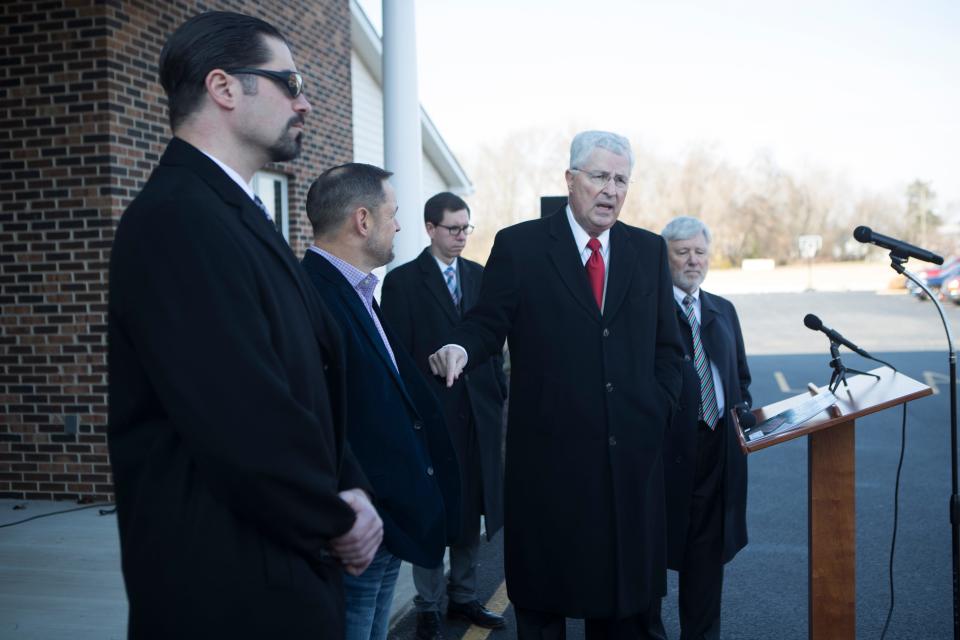Lawsuits ask that governors' emergency orders keep their 'hands off' houses of worship
Citing the rich history of uninterrupted religion during previous wide-scale diseases in this country, attorneys for two pastors on Wednesday announced the filing of separate lawsuits asking Delaware courts to prevent the state from imposing future restrictions on religious worship.
Thomas S. Neuberger, an attorney involved in one of the lawsuits, said the authors of the Delaware Constitution knew about the bubonic plague, malaria and other outbreaks that threatened humanity. Yet they so strongly believed people should be allowed to worship without restrictions in Delaware that the state's constitution is more explicit about that.
"We're asking the Delaware Court of Chancery – the world-renowned Delaware business court, the ancient court of equity from England – to enjoin Gov. [John] Carney and all future governors and order them to keep hands off the church in any future emergency," Neuberger said. "Regardless of any health, or other pretense that they wish to offer."

The lawsuits seek an injunction against future emergency orders that place restrictions on houses of worship such as those imposed by Carney last year as the pandemic spread across the state and nation.
Carney's office said it would not comment on the lawsuits.
The Rev. Alan Hines, of Townsend Free Will Baptist Church in Townsend, and the Rev. David Landow, of Emmanuel Orthodox Presbyterian Church in Wilmington, claim that Carney's emergency orders early in the pandemic denied the pastors their "absolute religious freedoms."
Through their lawsuits, they are asking Carney and future Delaware governors to keep their "hands off" the church in any future emergencies, regardless of any pretense they may offer.
NEW COVID-19 VARIANT: Omicron variant 'a cause for concern, not a cause for panic,' Biden says: Latest COVID-19 updates
Thomas C. Crumplar, another attorney involved in the filings, said his church faced charges when it allowed him to walk into the building at the start of the emergency orders.
"Yet, I could go to the liquor store on Sunday, and buy whatever I wanted to," Crumplar said. "I could drink, but I couldn't pray. That is absolutely absurd."
He added the government, in this country, has absolutely no right to interfere with how the church operates.

"Our final words are to the governor, Gov. Carney and all future governors, read the Constitution and therefore keep your hands off the church," Crumplar said.
While Carney declared churches essential in his emergency orders, he imposed restrictions beyond what he required other essential businesses to follow, according to the lawsuits. This included:
Prohibiting in-person Sunday religious services.
Preventing indoor preaching.
Banning singing.
Barring the elderly from church.
Prohibiting baptism.
Prohibiting the Lord’s Supper.
Favoring one religion over another.
About two months into Carney's restrictions last year, the Rev. Christopher Bullock, a New Castle-area pastor, filed a federal lawsuit in an effort to fully reopen Delaware's places of worship.
Background: Pastor ups legal challenge against Gov. Carney in attempt to fully open places of worship
The lawsuit was settled in November 2020. This agreement classified houses of worship as essential in any future emergency order and would not single those places out if further restrictions are implemented while COVID-19 cases spike in Delaware and around the country.

In exchange for Bullock dropping his lawsuit, Carney agreed that in any future emergency requiring state actions, the governor "must treat churches and religious worship in a neutral manner."
Federal lawsuit settled: Gov. Carney settles federal case over restrictions impacting places of worship in pandemic
Read the complaint filed by Revs. Alan Hines and David Landow:
Contact Esteban Parra at (302) 324-2299, eparra@delawareonline.com or Twitter @eparra3.
This article originally appeared on Delaware News Journal: Lawsuits: Delaware emergency orders shouldn't include houses of worship

